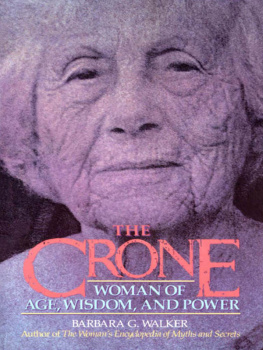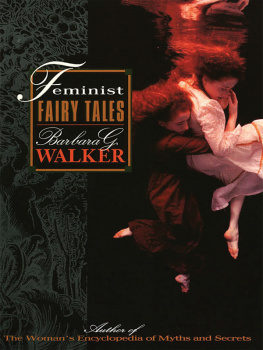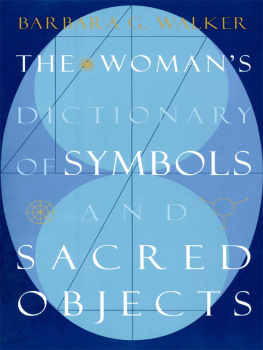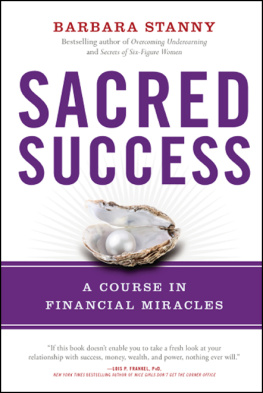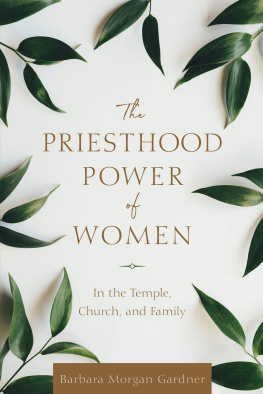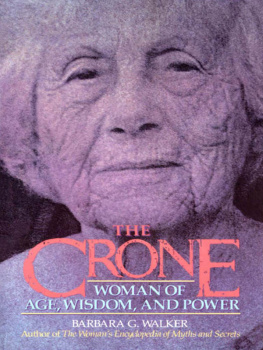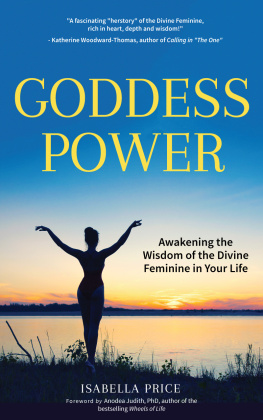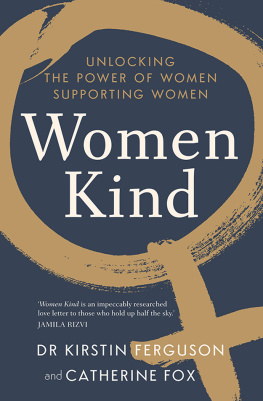Barbara G. Walker - The Crone: Woman of Age, Wisdom, and Power
Here you can read online Barbara G. Walker - The Crone: Woman of Age, Wisdom, and Power full text of the book (entire story) in english for free. Download pdf and epub, get meaning, cover and reviews about this ebook. year: 1988, publisher: Harper & Row, genre: Religion. Description of the work, (preface) as well as reviews are available. Best literature library LitArk.com created for fans of good reading and offers a wide selection of genres:
Romance novel
Science fiction
Adventure
Detective
Science
History
Home and family
Prose
Art
Politics
Computer
Non-fiction
Religion
Business
Children
Humor
Choose a favorite category and find really read worthwhile books. Enjoy immersion in the world of imagination, feel the emotions of the characters or learn something new for yourself, make an fascinating discovery.
- Book:The Crone: Woman of Age, Wisdom, and Power
- Author:
- Publisher:Harper & Row
- Genre:
- Year:1988
- Rating:4 / 5
- Favourites:Add to favourites
- Your mark:
- 80
- 1
- 2
- 3
- 4
- 5
The Crone: Woman of Age, Wisdom, and Power: summary, description and annotation
We offer to read an annotation, description, summary or preface (depends on what the author of the book "The Crone: Woman of Age, Wisdom, and Power" wrote himself). If you haven't found the necessary information about the book — write in the comments, we will try to find it.
The Crone: Woman of Age, Wisdom, and Power — read online for free the complete book (whole text) full work
Below is the text of the book, divided by pages. System saving the place of the last page read, allows you to conveniently read the book "The Crone: Woman of Age, Wisdom, and Power" online for free, without having to search again every time where you left off. Put a bookmark, and you can go to the page where you finished reading at any time.
Font size:
Interval:
Bookmark:

Studying the Crone
The Lost Crone
The Wise Crone
The Terrible Crone
The Crone and the Cauldron
The Crone Turns Witch
The Doomsday Crone
The Future Crone
The Womans Encyclopedia of Myths and Secrets
The Secrets of the Tarot: Origins, History, and Symbolism
The Barbara Walker Tarot Deck
The I Ching of the Goddess
The Skeptical Feminist: Discovering the Virgin, Mother, and Crone
The Womans Dictionary of Symbols and Sacred Objects
The Book of Sacred Stones: Fact and Fallacy in the Crystal World Womens Rituals: A Sourcebook
THE CRONE: Woman of Age, Wisdom and Power . Copyright 1985 by Barbara G. Walker. All rights reserved under International and Pan-American Copyright Conventions. By payment of the required fees, you have been granted the non-exclusive, non-transferable right to access and read the text of this ebook on-screen. No part of this text may be reproduced, transmitted, down-loaded, decompiled, reverse engineered, or stored in or introduced into any information storage and retrieval system, in any form or by any means, whether electronic or mechanical, now known or hereinafter invented, without the express written permission of HarperCollins ebooks.
FIRST HARPERCOLLINS PAPERBACK EDITION PUBLISHED IN 1988.
Library of Congress Cataloging-in-Publication Data
Walker, Barbara G.
The crone: woman of age, wisdom, and power.
1. WomenReligious life. 2. MatriarchyReligious aspects. 3. PatriarchyReligious aspects. I. Title
BL625.7W35 1985 291.178344 85-42939
ISBN 0-06-250928-4
ISBN 0-06-250934-9 (pbk.)
04 05  / RRD(H) 30 29 28 27 26 25 24
/ RRD(H) 30 29 28 27 26 25 24
EPub Edition APRIL 2013 ISBN: 9780062288882
All over the modern world, a new social phenomenon is gradually taking shape. Women, the traditional pillars of Judeo-Christian religion, are turning against this faith. Many women prefer to gather in small grass-roots groups in each others homes, where they discuss recent studies of prepatriarchal Goddess worship and engage in rituals aimed at recreating some feeling for those ancient faiths.
Because of its private nature, the phenomenon is almost invisible to the public eye. Occasionally, the popular press takes a passing interest in it, giving it the label witchcraft, which is understood to be mildly newsworthy. Under another one of its labels, the womens spirituality movement, the phenomenon is hardly defined or even definable in this mans world.
The womens spirituality movement has given many women better feelings about themselves, in consequence of joining together with other women in groups, gatherings, circles, covens, or conferences. Women touch, embrace, communicate. They share food, feelings, thoughts, and ideas. They praise each others accomplishments. They support each other in trouble. They provide sympathy for hurts, advice for problems, many kinds of mutual education. They laugh or cry together, love or quarrel, lend things, give gifts, do favors. Some find in womens groups the closest relationships of their lives, closer than their bonds with husbands, children, or parents. Others drop out after a time, but with changed attitudes.
Women have always banded together along the underside of male-dominated social structures. Aside from obvious natural bonds among female family members, women have always joined all-female groups that in some way served the mutual support functions listed above, whenever they could. Old-fashioned sewing circles and quilting bees gave their members more than needlework expertise. Grandmas Saturday afternoon teas or Sunday luncheons held more rewards for Grandma and her friends than men ever noticed. Volunteer groups, community services, neighborhood committees, social clubs, church and charity organizations, even bridge clubs or the PTA gave women opportunities to meet and work with one another, to communicate, cooperate, and widen their circles of friends.
Women working together on almost any kind of project have inevitably formed mutually supportive relationships out of their common needs and shared life experiences. When a woman has faced any of lifes common crisesbirth, bereavement, illness, sudden misfortune, troubles with love or workthere have usually been other women there to help.
Male-dominated society still exploits womens natural propensity to care, to nurture, to take responsibility for the comfort of others. Unfortunately, feminists still allow this to happen. Nothing much has been changed so far by women talking together of the Goddesss blessings instead of the annual fund-raising party, or of the archetypal power of femaleness instead of their childrens grades.
As far as most men are concerned, womens talk is still womens talk, having little to do with the real worldthat is, the world where money is made. Men with power in that world seldom pay attention to what women say among themselves. They even pride themselves on their ignorance of it. They still believe womens groups perform busywork, the only real purpose of which is to keep women off the streets and away from the seats of genuine power.
Because Goddess worshipers use the term power much more loosely, they need to understand that, to men, it means the capacity to threaten or destroy. Like it or not, the fate of all women, their children, and their earth lies in the untrustworthy hands of men corrupted by their lifelong craving for that real power, which also corrupts women in ways so numerous and so subtle that it takes a very high degree of consciousness-raising to name and avoid even a fraction of them.
Patriarchal society has always found ways to exploit womens need for what is called busywork. Done in solitude, such work has been thought to provide a harmless outlet for frustrated female creativity that will never become commercially viable (the only raison dtre recognizable by the patriarchy). Done in company, such work has been thought to provide harmless ways for women to help one another support male-headed institutions: family, government, church.
A prime example of such exploitation is the churches canny enlistment of women to work without pay for their cause: promoting the patriarchal God and his ever-acquisitive priesthoods, after the latter spent centuries demolishing womens own religions. A human analogy is found in the Bible: Yahweh directed his warriors to take heathen girl children as their household slaves and concubines, after raping and killing the girls mothers (Num. 31:1718; Judges 21:1012).
If a few women today talk of resurrecting the long-since raped and killed Divine Mother, many churchmen believe they can be ignored as too few, and usually too poor, to matter. Churches go on enjoying the faithful service of their unpaid ladies auxiliaries and maintain the conventional idea that women who recognize no church, or who call themselves witches and Goddess worshipers, are only lunatic-fringe cultists, misled by some diabolical power into making fools of themselves.
In one sense, women may again play into patriarchal hands when they leave conventional religion behind and begin to study, work, and play with the older matriarchal concepts. Most Goddess worshipers emphasize such traits as human warmth, love, sensitivity, generosity, and nonjudgmental acceptance. Lo and behold, the same traits were always urged upon Christian women too. Through the course of European history, by the golden rule standard, women were the only true Christians. Their men may have talked fine rhetoric about loving their enemies and giving away all their worldly goods; but in practice, Christian men slaughtered their enemies in unending wars, crusades, and persecutions, while their church was the richest institution in a Europe foully poisoned by the abject poverty of its general population.
Font size:
Interval:
Bookmark:
Similar books «The Crone: Woman of Age, Wisdom, and Power»
Look at similar books to The Crone: Woman of Age, Wisdom, and Power. We have selected literature similar in name and meaning in the hope of providing readers with more options to find new, interesting, not yet read works.
Discussion, reviews of the book The Crone: Woman of Age, Wisdom, and Power and just readers' own opinions. Leave your comments, write what you think about the work, its meaning or the main characters. Specify what exactly you liked and what you didn't like, and why you think so.

